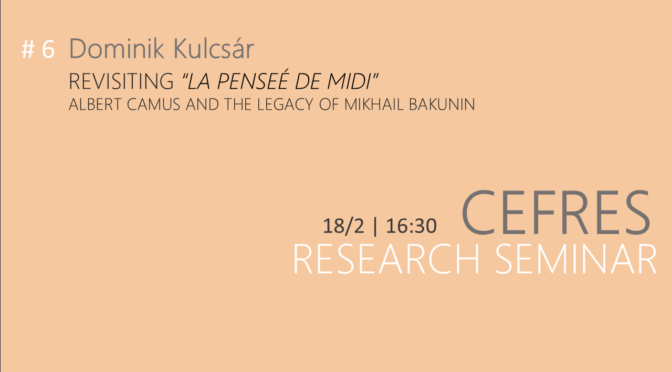Revisiting “La pensée de midi” – Albert Camus and the Legacy of Mikhail Bakunin
6th session of CEFRES in-house seminar
Through the presentation of works in progress, CEFRES’s Seminar aims at raising and discussing issues about methods, approaches or concepts, in a multidisciplinary spirit, allowing everyone to confront her or his own perspectives with the research presented.
Location: CEFRES Library and online, to get the link, write to cefres[@]cefres.cz
Date: Tuesday, 18th February, 2025 at 4:30 p.m.
Language: English
It wll be hosted by:
Dominik Kulcsár (CEFRES / Institute of Philosophy, Slovak Academy of Sciences)
Chair: Dan SWAIN (Institute of Philosophy, Czech Academy of Sciences)
Abstract
The concept of transgression is necessary for challenging or reforming the status quo. When existing norms become outdated and counterproductive, for example, when they undermine the well-being of the community, or reinforce systemic inequalities, challenging them becomes a matter of moral duty. Such norms then have to be reformed or outright dismantled. At the core of transgression lies the concept of revolt. In contemporary society, however, revolt increasingly serves as the preffered means, by which the individual pursues their self-interest, often at the expense of the community. If revolt is driven by, for example, a notion of freedom that sees the individual sphere of autonomy as impervious to any outside interference, its consequences can be outright destructive. During the recent COVID-19 pandemic, we have witnessed revolts against public health measures precisely in the name of freedom. In my dissertation, I am confronting such misconceived understanding of freedom, by reconstructing the concepts of revolt in the writings of the Russian Anarchist Mikhail Bakunin, and the French existential writer Albert Camus. Both thinkers tied the notion of revolt to the notion of freedom, and as such, I am looking for ideas in their writings, which could be critically translated into a coherent understanding of rational revolt. Specifically, I am interested in just how effectively can the individual in revolt challenge the existing norms and institutions, and strive for their transformation or complete dismantlement (if necessary) in a way that is constructive, i.e. that improves the existing conditions, rather than simply destroys them without replacement. My dissertation is building upon an already existing, but largely unacknowledged connection, between Bakunin and Camus. In particular, Camus, in 1952, in a reply to the French anarchist Gaston Leval, wrote: “Bakunin is alive in me, as he is in our time.” While this line largely refers to a shared critique of authoritarian State socialism, I have discovered that Bakunin’ s and Camus’s perspectives on revolt are conceptually profoundly complementary. The purpose of my presentation is to first present my current findings, and second, to asses just how much is Camus indebted to his anarchist predecessor.
Please find the complete program of 2024-2025 seminar here.

